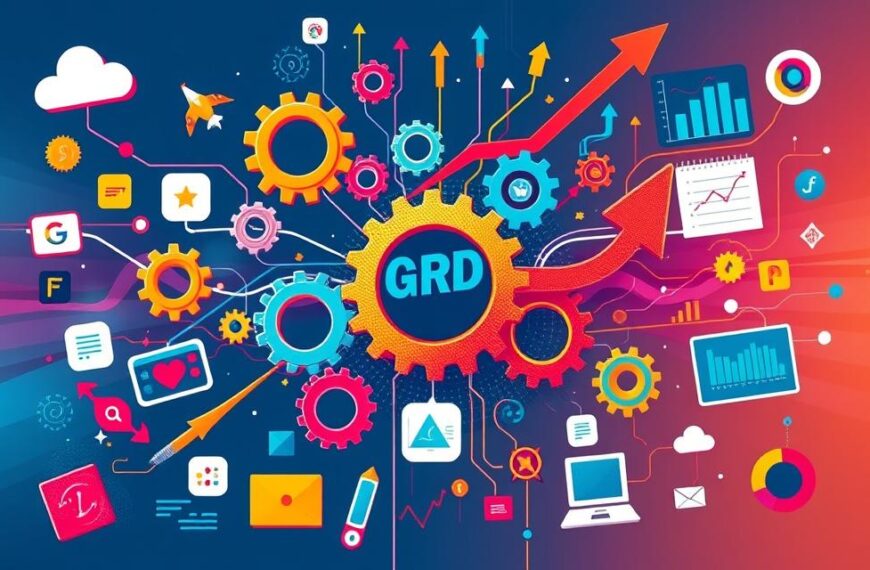AI has become key to success for small businesses today. It makes workflows quicker and boosts efficiency. This lets small companies hold their own against bigger ones. Nearly 98% of small businesses use AI tools now. This jump in generative AI shows a move towards new ways of working. As AI gets better, small businesses can grow fast and adapt to changes well.
AI brings big benefits. For instance, chatbots offer quick customer service. Personalised marketing learns from customer choices to boost engagement. AI helps with making sales predictions, understanding data, and making the supply chain better. By using AI, small businesses save time and money. They also get a strong spot in the market. With AI growing with them, small companies are ready to face challenges and grab new chances.
Understanding AI and Its Importance for Small Businesses
Artificial Intelligence (AI) is changing the game for small firms. It lets them boost efficiency and stand toe-to-toe with big companies. AI mimics human abilities like learning and solving problems. For small businesses, AI can make work quicker and better, helping them stand out in a tough market.
Defining AI in the Context of Small Enterprises
More small enterprises are using AI, with 48% adopting AI tools. The role of AI in these firms is big. It streamlines everyday jobs, crunches big data sets, and offers valuable advice. AI helps in various ways, from chatbots for customer help to smart marketing platforms.
The Competitive Edge Provided by AI
Getting into AI gives small companies a big leg up. A 2023 survey by the Small Business and Entrepreneurship Council shows 83% of small firms plan to spend on AI soon. This move is key. AI apps boost how well a company works, increasing customer happiness and cutting costs. Firms using AI can see their sales predictions get 50% better, giving them a solid spot in the market.
How Does AI Help Small Businesses
AI is changing small businesses by making them more productive and improving how they talk to customers. It makes customer service, marketing, and operations better. This helps smaller businesses keep up in a fast-changing market.
Enhancing Customer Service with AI Tools
AI has changed how companies talk to customers. Chatbots and virtual assistants offer help any time, answering questions right away. This makes customers happy and lets staff tackle harder issues.
AI tools keep service levels high without hiring more people. This makes businesses run more smoothly.
The Role of AI in Marketing and Customer Engagement
Using AI in marketing helps understand what customers like and dislike. It helps make ads that really speak to people, which means more responses and sales. For example, AI can help write ads and plan social media, saving time and sparking more creativity.
It lets owners focus on the big picture of their business.
Boosting Operational Efficiency through Automation
AI makes things more efficient by taking over simple tasks like entering data and planning schedules. This cuts mistakes and helps small businesses do more without more people. AI automation can boost productivity by 40%, showing its huge impact.
Small business owners can use AI to do more with less. It’s a big advantage in today’s world.
Innovative Applications of AI for Small Business Growth
Small businesses are now tapping into the power of AI to boost growth and efficiency. They find predictive analytics and personalisation extremely helpful. These features improve decision-making and the overall customer experience.
Utilising Predictive Analytics for Strategic Decision-Making
Predictive analytics lets small businesses analyse past data to predict future trends. By spotting patterns, they can make smart choices that match market demands. This improves decision-making, letting them foresee customer likes and use resources wisely. Using data-driven strategies backed by predictive analytics boosts their performance.
Personalising Customer Experience with AI Recommendations
AI personalisation changes how small businesses interact with customers. By using AI, they offer recommendations tailored to each customer’s habits and likes. This approach not only boosts sales but also builds loyalty through higher satisfaction. Providing unique experiences sets small businesses apart in a tight market, helping them succeed as things keep changing.
Tackling Supply Chain and Inventory Challenges with AI
AI is changing the game in supply chain management. It offers new ways to handle old problems. Now, businesses can meet customer needs better and use resources wisely. AI helps make smarter decisions, cuts costs, and boosts supply chain performance.
Predictive Analytics in Inventory Management
AI’s predictive analytics help businesses predict demand precisely. They use past data and market trends to manage stock better. This way, companies avoid having too much or too little stock. They save money and make sure products are available when customers need them.
Streamlining Supply Chain Efficiency
AI makes supply chains run smoother by spotting problems and suggesting improvements. It analyses data in real-time, speeding up orders and enhancing warehouse operations. With AI, routes and logistics are refined for on-time deliveries and happier customers.
Reducing Costs through AI Insights
Using AI can lead to big cost savings. It takes over routine tasks, freeing up resources for important work. AI also improves how companies work with suppliers. This results in better partnerships and more savings.
| Aspect | Traditional Approach | AI-Driven Approach |
|---|---|---|
| Inventory Forecasting | Historical data analysis | Predictive analytics with AI |
| Order Fulfillment | Manual processes | Automated workflows |
| Cost Management | Reactive adjustments | Proactive cost reduction strategies |
| Supplier Evaluation | Basic performance reviews | Data-driven performance analysis |
Adding AI to supply chain management solves many issues and opens doors to new improvements. As technology grows, businesses that use these solutions will lead the market. They’ll do things more efficiently and spend less money.
Security Considerations When Implementing AI Solutions
Small businesses are getting into technology more than ever. This makes knowing about cybersecurity very important. Cyber threats can put data at risk. This affects how companies work and how customers see them. Using AI for security helps a lot. It spots digital dangers fast, protecting important info before it’s too late.
The Importance of Cybersecurity in the Digital Age
The rise of generative AI has changed many businesses. But, it also makes cybersecurity more complex. A 2023 report by McKinsey says nearly one-fourth of global businesses use generative AI. But, using AI tools can risk data leaks, leading to big financial problems. This means firms must follow rules like GDPR and HIPAA closely.
Implementing AI for Enhanced Security Measures
AI can make security much better. For example, AI systems can watch transactions for strange patterns to stop fraud. Still, companies need to be careful. They shouldn’t ignore the value of human insight or think AI can’t make mistakes. Teaching staff well and keeping AI systems up-to-date can really strengthen security.
| Security Elements | Traditional Methods | AI-Driven Solutions |
|---|---|---|
| Threat Detection | Manual monitoring | Real-time alerts based on AI analysis |
| Data Protection | Basic encryption | Adaptive encryption using machine learning |
| Incident Response | Post-incident analysis | Automated corrective actions |
| Employee Training | Occasional workshops | Continuous learning with AI insights |
Conclusion
AI gives small businesses a big boost. It makes operations more efficient and helps them grow. By using AI, small businesses can do routine tasks quickly. This gives them time to focus on new ideas. Also, AI helps them connect better with customers.
AI tools like chatbots offer help anytime, making customer service better. Great service makes customers loyal. Small businesses can also understand market trends better with AI. This helps them make marketing plans that really speak to their customers. For more on technology in business, visit key technologies transforming modern business operations.
Adopting AI is a smart move for small businesses. It helps them stand out and do well, even against big companies. Recognising the value of AI can lead small businesses to do well today and in the future.
FAQ
What is AI and how does it benefit small businesses?
AI, or artificial intelligence, is when machines act like humans by learning and making decisions. It helps small businesses work more efficiently and make smart, data-based choices. This gives them an advantage over rivals in the marketplace.
How can AI improve customer service for small enterprises?
AI tools, including chatbots, provide help any time of the day. This quick support lets businesses handle simple questions fast. Staff then have time for tougher issues, boosting customer happiness and loyalty.
What role does AI play in marketing for small businesses?
AI studies customer actions and likes, helping to craft personalised marketing. This approach draws more interest and leads to better sales. This makes marketing more effective, giving small businesses more bang for their buck.
Can AI help small businesses with inventory management?
Yes, it can! AI uses predictions to guess demand, helping to keep the right amount of stock. This avoids both too much and too little stock, leading to better inventory control.
How does AI strengthen cybersecurity for small businesses?
AI boosts security by spotting and acting on online threats fast. This keeps both business and customer data safe. It builds trust and keeps important information secure.
What are some innovative AI applications small businesses can adopt?
Small companies can use AI for smart planning and offering custom suggestions to customers. These steps improve customer experiences and help the business grow steadily.
How can small businesses start integrating AI into their operations?
Start small by adding AI to areas like customer help or marketing first. This eases the business into AI use and supports growth and innovation over time.


















